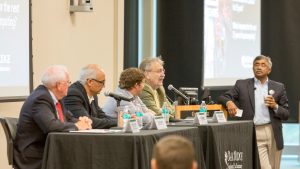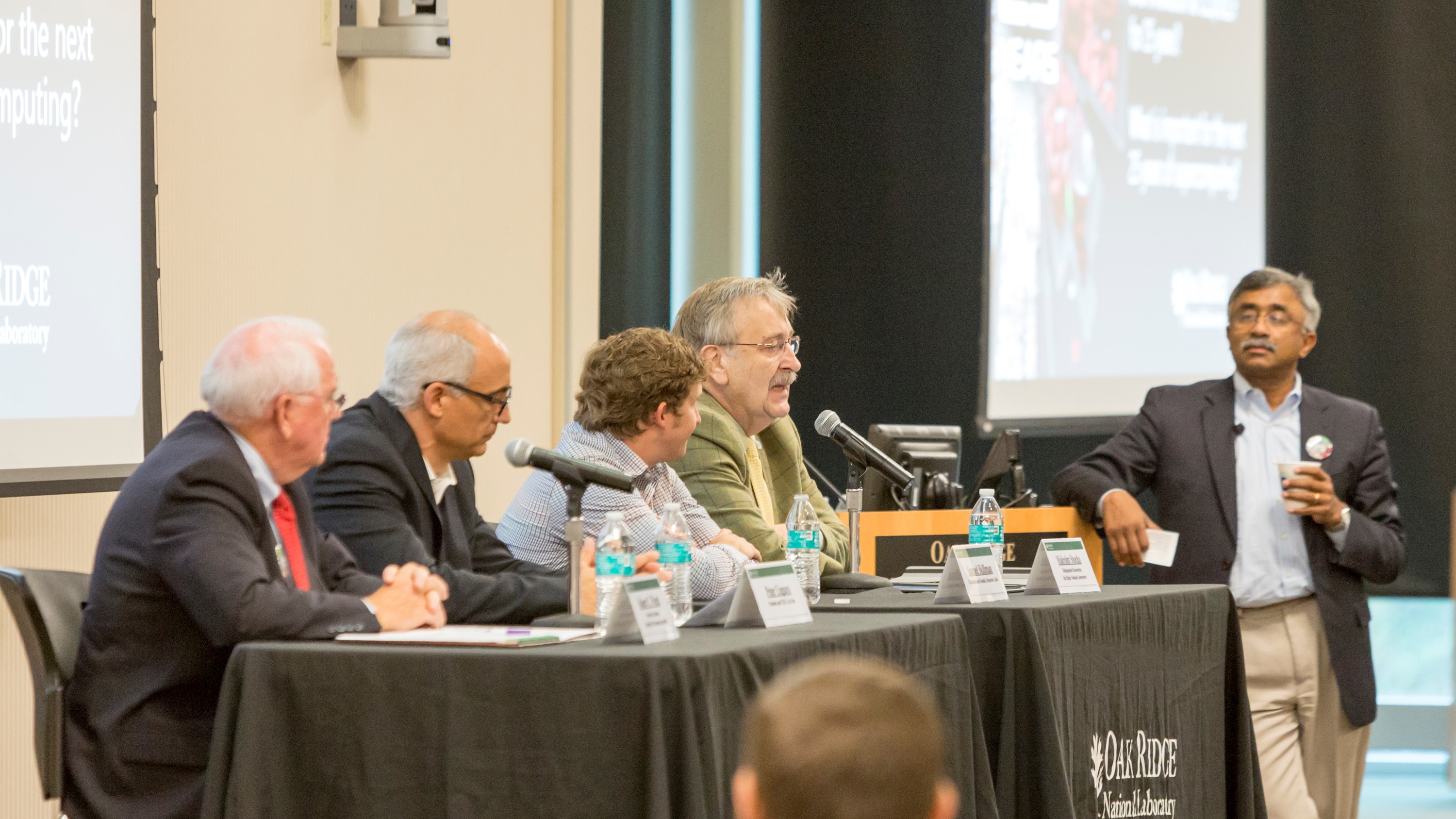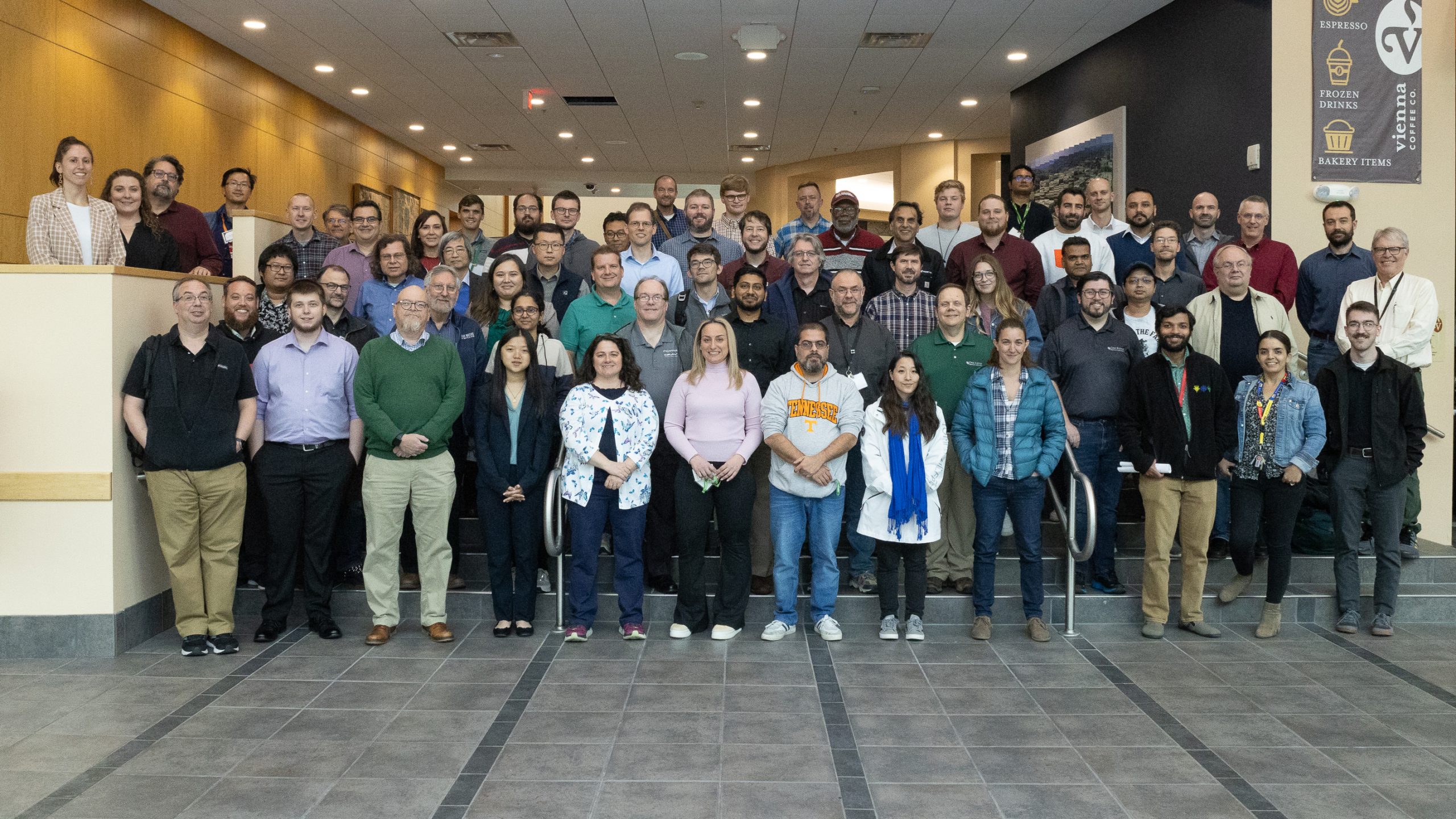
Oak Ridge National Laboratory (ORNL) Director Thomas Zacharia, far right, leads a keynote panel “Building the Conditions for Innovation” that reflects on the Oak Ridge Leadership Computing Facility’s history and predicts what the future of high-performance computing may look like. Panel members include (left to right): Robert Ward (University of Tennessee professor emeritus), Peter Ungaro (Cray, Inc. president and CEO), Samuel Skillman (Descartes Labs computational scientist), and Malcolm Stocks (ORNL distinguished researcher).
On Tuesday, the Oak Ridge Leadership Computing Facility (OLCF) at Oak Ridge National Laboratory (ORNL) celebrated 25 years of high-performance computing (HPC). ORNL hosted leaders from government, academia, and industry for a half-day of presentations to recognize the technical and scientific achievements of OLCF staff over the last quarter-century and discuss the future of supercomputing and the leadership computing facility.
The OLCF anniversary event coincided with ORNL’s Eugene P. Wigner Lecture in Science, Technology, and Policy, presented by Nobel Laureate Martin Karplus, a pioneer in computational chemistry.
Since ORNL founded the Center for Computational Sciences (CCS) in 1992, scientists studying materials science, chemistry, and other disciplines have worked with computational scientists to leverage increasingly powerful supercomputers for solving complex problems in the areas of energy, the environment, and the fundamental sciences. A global leader in HPC, OLCF deployed the first teraflop and petaflop systems for open science and two top-ranked machines on the Top500 list, including the 27-petaflop, GPU-accelerated Titan system. The OLCF is now installing Summit, a pre-exascale system that will be at least five times more powerful than Titan.
Laboratory Director Thomas Zacharia led a keynote panel titled “Building the Conditions for Innovation” that reflected on the challenges in establishing and growing a supercomputing center at ORNL and predictions for the future of supercomputing. Panel members included Malcolm Stocks, ORNL distinguished researcher and two-time recipient of the Association for Computing Machinery’s Gordon Bell Prize; President and CEO of long-standing OLCF vendor partner Cray, Inc., Peter Ungaro; Professor Emeritus at the University of Tennessee and former CCS director Robert Ward; and Samuel Skillman, a computational scientist at the cloud-based supercomputing start-up Descartes Labs and former fellow in the Department of Energy Computational Science Graduate Fellowship program.
Following the panel, Michael McQuade, Senior Vice President for Science and Technology at United Technologies, presented on the importance of HPC to industry. United Technologies is an industry user of OLCF resources. Clayton Clem, Vice President of Transmission Strategic Projects and Initiatives at the Tennessee Valley Authority (TVA), discussed the long partnership between ORNL and TVA to supply power to science research facilities, including leadership computing. Jeremy Smith, director of ORNL’s Center for Molecular Biophysics and UT-ORNL Governor’s Chair, shared the bioenergy discoveries enabled by OLCF petascale computing and the anticipated challenges of simulating an entire cell atom-by-atom on exascale computers. At a speakers’ lunch, David Zachmann, professor emeritus of mathematics at Colorado State University, presented on early DOE educational programs and their role in building a computational science workforce.
Attendees and ORNL staff also participated in tours of the OLCF, including Titan, the installation of Summit, and the visualization laboratory, EVEREST.
To learn more about OLCF’s purpose, history, and achievements, view:
- An interactive timeline
- A video on the history of the OLCF
- The report Twenty-five Years of Leadership Science at the Oak Ridge Leadership Computing Facility
- Photos from the anniversary event
Oak Ridge National Laboratory is supported by the US Department of Energy’s Office of Science. The single largest supporter of basic research in the physical sciences in the United States, the Office of Science is working to address some of the most pressing challenges of our time. For more information, please visit science.energy.gov.






